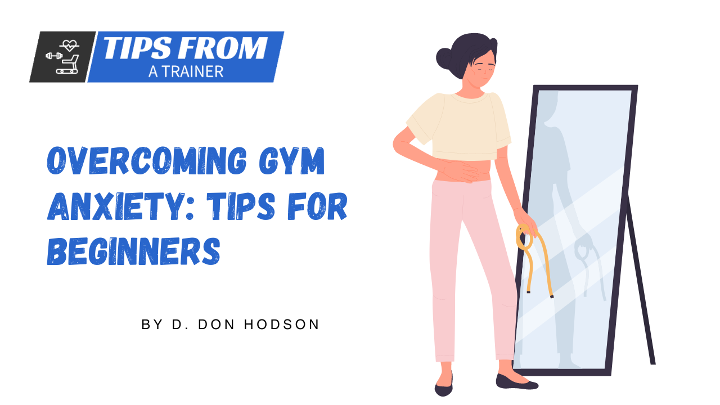Introduction
Gym anxiety, also known as gym phobia or exercise-related anxiety, refers to the fear, discomfort, or nervousness experienced by individuals when entering or participating in a gym environment. It is a common feeling that can affect beginners who are new to fitness centers or even experienced individuals who may feel self-conscious or intimidated by the gym setting. Gym anxiety can manifest in various ways, such as a fear of judgment, feeling self-conscious about appearance, or uncertainty about equipment and exercises.
Addressing gym anxiety is crucial for individuals who want to engage in regular exercise and reap the numerous benefits it offers. Regular physical activity has been linked to improved physical health, mental well-being, stress reduction, and increased self-confidence. However, when gym anxiety prevents individuals from participating in gym workouts, it can hinder their ability to achieve their fitness goals and experience the positive outcomes associated with exercise. By understanding and overcoming gym anxiety, beginners can create a more positive and empowering relationship with the gym environment and develop a sustainable fitness routine.
This article aims to provide practical tips, strategies, and coping mechanisms to help beginners overcome gym anxiety and feel more confident in the gym setting. It will explore the common causes of gym anxiety, the effects it can have on physical and mental well-being, and ways to overcome these challenges. Additionally, the article will provide practical advice for building gym confidence, including tips for setting realistic goals, educating oneself about gym equipment and exercises, creating a supportive environment, developing a positive mindset, and utilizing visualization and relaxation techniques. It will also offer practical tips for dressing comfortably and confidently, planning and preparing for gym sessions, utilizing gym orientation and introductory sessions, practicing proper gym etiquette, and celebrating small victories and progress.
By implementing the strategies and tips outlined in this article, beginners can navigate the gym environment with confidence, overcome their fears and anxieties, and create a positive and rewarding fitness journey.
Table of Contents
Introduction
Understanding Gym Anxiety
Common Causes of Gym Anxiety
Effects of Gym Anxiety on Physical and Mental Well-Being
Strategies for Overcoming Gym Anxiety
Setting Realistic Goals
Educating Yourself about Equipment and Exercises
Creating a Supportive Environment
Developing a Positive Mindset
Utilizing Visualization and Relaxation Techniques
Embracing the Learning Process
Celebrating Small Victories and Progress
Developing a Consistent Routine
Creating a Schedule
Starting Slow and Progressing Gradually
Incorporating Variety and Enjoyment
Seeking Guidance and Support
Hiring a Personal Trainer
Joining Group Fitness Classes
Engaging with Online Communities
Managing Anxiety at the Gym
Deep Breathing and Visualization Techniques
Positive Self-Talk and Affirmations
Gradual Exposure and Desensitization
Start with Familiar Exercises and Equipment
Gradually Increase Gym Attendance
Seek Support from a Workout Buddy
Conclusion

Understanding Gym Anxiety
Common Causes of Gym Anxiety
To effectively address gym anxiety, it is essential to understand its common causes. By recognizing the root causes, individuals can develop targeted strategies to overcome their anxieties.
Fear of Judgment
One of the primary causes of gym anxiety is the fear of being judged by others. Beginners may worry about their physical appearance, fitness level, or lack of knowledge about exercises and equipment. The fear of being watched, evaluated, or compared to others can create significant anxiety and self-consciousness.
Feeling Self-Conscious about Appearance
Many beginners feel self-conscious about their bodies when entering a gym. They may compare themselves to others who appear more fit or have a certain body shape. This self-consciousness can make individuals hesitant to engage in certain exercises or activities, fearing that they will stand out or be perceived negatively.
Uncertainty about Equipment and Exercises
The unfamiliarity with gym equipment and exercises can also contribute to gym anxiety. Beginners may feel overwhelmed and intimidated by the wide range of machines, weights, and exercise techniques available. The fear of using equipment incorrectly or not knowing how to perform exercises properly can deter individuals from trying new things.
Comparing Yourself to Others
Constantly comparing oneself to others in the gym can fuel anxiety. It's important to remember that everyone has their own fitness journey and starting point. Comparing oneself to more experienced individuals can be demotivating and create unnecessary pressure.
Effects of Gym Anxiety on Physical and Mental Well-Being
Gym anxiety can have negative effects on both physical and mental well-being, which further emphasizes the importance of addressing it.
Physical Consequences
When individuals experience gym anxiety, they may avoid exercise altogether or limit themselves to certain activities. This can hinder their progress and overall physical fitness. Regular exercise is essential for cardiovascular health, strength, flexibility, and weight management. By overcoming gym anxiety, individuals can fully engage in a variety of workouts and reap the benefits of a well-rounded fitness routine.
Mental and Emotional Impact
Gym anxiety can also take a toll on mental and emotional well-being. It can lead to feelings of self-doubt, low self-esteem, and decreased motivation. Anxiety about the gym can create barriers to establishing a regular exercise routine, which is known to have positive effects on mental health, including reducing symptoms of anxiety and depression. Overcoming gym anxiety allows individuals to build confidence, improve self-image, and enhance overall mental well-being.
Strategies for Overcoming Gym Anxiety
Setting Realistic Goals
Setting realistic and achievable goals is crucial for overcoming gym anxiety. Begin by identifying what you want to achieve in your fitness journey. Start with small, attainable goals that align with your current fitness level and gradually work towards more challenging objectives. Celebrate each milestone along the way, as these small victories will boost your confidence and motivation.
Educating Yourself about Equipment and Exercises
Knowledge is power when it comes to overcoming gym anxiety. Take the time to educate yourself about the equipment and exercises you'll encounter in the gym. Research different workout routines, watch tutorial videos, or consider hiring a personal trainer for guidance. Understanding how to properly use the equipment and perform exercises will not only increase your confidence but also prevent injuries.
Creating a Supportive Environment
Surrounding yourself with a supportive and encouraging environment can significantly alleviate gym anxiety. Consider working out with a friend or joining group fitness classes where you can meet like-minded individuals. Having a support system can provide motivation, accountability, and reassurance. Additionally, seek out trainers or staff members who are approachable and willing to assist you when needed.
Developing a Positive Mindset
Utilizing Visualization and Relaxation Techniques
Visualization and relaxation techniques can help calm your mind and alleviate anxiety before and during gym sessions. Prior to going to the gym, spend a few minutes visualizing yourself confidently performing exercises and enjoying your workout. Practice deep breathing exercises or mindfulness techniques to relax your body and mind. By incorporating these techniques, you can reduce stress and increase focus, allowing for a more positive gym experience.
Embracing the Learning Process
Remember that everyone starts somewhere, and being a beginner is part of the journey. Embrace the learning process and view each gym session as an opportunity to improve and grow. Recognize that mistakes and setbacks are normal and essential for progress. Approach new exercises or equipment with curiosity and a willingness to learn. By adopting a growth mindset, you'll develop resilience and overcome any self-doubt or fear of failure.
Celebrating Small Victories and Progress
Acknowledge and celebrate your achievements, no matter how small they may seem. Whether it's completing an extra repetition, increasing the weight, or trying a new exercise, recognize your progress and give yourself credit for your efforts. Celebrating small victories reinforces positive behaviors, boosts self-confidence, and helps to maintain motivation throughout your fitness journey.
Developing a Consistent Routine
Creating a Schedule
Developing a consistent workout routine can help alleviate gym anxiety by providing structure and familiarity. Set aside specific days and times for your gym sessions and treat them as non-negotiable appointments with yourself. By creating a schedule, you'll establish a routine that becomes a natural part of your lifestyle, reducing any anxiety associated with uncertainty or inconsistency.
Starting Slow and Progressing Gradually
When starting a gym routine, it's important to ease into it and progress gradually. Pushing yourself too hard or setting unrealistic expectations can lead to burnout or injury, which may further contribute to gym anxiety. Begin with lighter weights, shorter workout durations, or less intense exercises, and gradually increase the intensity and duration as your fitness level improves. This progressive approach allows your body to adapt and minimizes the risk of overwhelming yourself mentally and physically.
Incorporating Variety and Enjoyment
Monotony can hinder motivation and contribute to gym anxiety. Incorporating variety into your workouts can make them more enjoyable and prevent boredom. Explore different types of exercises, equipment, and classes to find what you genuinely enjoy. This could include strength training, cardio exercises, yoga, dance classes, or outdoor activities. By diversifying your routine, you'll stay engaged and look forward to your workouts, reducing anxiety and making the gym experience more enjoyable.
Seeking Guidance and Support
Hiring a Personal Trainer
Working with a qualified personal trainer can be immensely beneficial for beginners dealing with gym anxiety. Trainers have the expertise to design personalized workout programs, demonstrate proper form, and provide guidance throughout your fitness journey. They can also offer motivation, support, and accountability, helping you overcome challenges and build confidence in the gym.
Joining Group Fitness Classes
Group fitness classes provide a supportive and inclusive environment for individuals of all fitness levels. By joining these classes, you can experience the benefits of a structured workout led by a knowledgeable instructor while being surrounded by a community of like-minded individuals. Group classes can be less intimidating than working out alone, as you'll feel a sense of camaraderie and support from others who share similar goals.
Engaging with Online Communities
In today's digital age, online communities and forums can offer a valuable source of support and advice. Many fitness enthusiasts and beginners alike share their experiences, tips, and motivation in these online spaces. Engaging with these communities can provide you with a sense of belonging, guidance, and encouragement. You can seek advice, ask questions, or simply share your progress, knowing that others are on a similar journey.
Managing Anxiety at the Gym
Deep Breathing and Visualization Techniques
When you feel anxiety creeping in at the gym, incorporating deep breathing and visualization techniques can be helpful in calming your mind and focusing on the present moment. Take slow, deep breaths in through your nose and exhale through your mouth. Visualize yourself performing exercises with confidence and ease. By redirecting your focus and practicing relaxation techniques, you can reduce anxiety and enhance your overall gym experience.
Positive Self-Talk and Affirmations
The way we speak to ourselves greatly impacts our emotions and actions. Replace negative thoughts with positive self-talk and affirmations. Remind yourself of your capabilities, progress, and the reasons why you started your fitness journey. Encourage yourself during challenging moments and celebrate small victories. By cultivating a positive mindset, you can build self-confidence and combat gym anxiety.
Gradual Exposure and Desensitization
Start with Familiar Exercises and Equipment
If certain exercises or equipment trigger anxiety, start by focusing on familiar ones. Begin your workouts with exercises you feel comfortable with and gradually introduce new exercises or equipment over time. This gradual exposure allows you to build confidence and familiarity, making it easier to tackle new challenges.
Gradually Increase Gym Attendance
If gym anxiety makes you hesitant to go regularly, start by committing to shorter gym sessions or fewer weekly visits. As you become more comfortable, gradually increase the duration and frequency of your gym visits. By taking small steps and allowing yourself to adjust at your own pace, you'll build resilience and confidence.
Seek Support from a Workout Buddy
Having a workout buddy can provide a sense of reassurance and support, especially when dealing with gym anxiety. Find a friend or family member who shares similar fitness goals and invite them to join you at the gym. Having a familiar face by your side can make the experience more enjoyable and alleviate anxiety. You can motivate each other, try new exercises together, and provide encouragement when needed.
Conclusion
Overcoming gym anxiety is a journey that requires patience, perseverance, and self-compassion. By implementing the strategies outlined in this article, you can gradually build your confidence, manage anxiety, and create a positive gym experience. Remember, everyone starts somewhere, and the gym is a place for personal growth and improvement.
Embrace the process, focus on your goals, and celebrate each step forward. With time and practice, you'll find that your gym anxiety diminishes, and you can fully enjoy the benefits of exercise and fitness.

Don Hodson, Certified Personal Trainer
I'm Don, an ACE-certified personal trainer and the founder of Tips From A Trainer. With my passion for fitness and years of experience, I've helped countless individuals transform their physiques!
Having personally overcome weight challenges throughout my life, I understand the struggle. Through consistency, exercise, and a balanced diet, I have managed to stay in shape and I want to share my message with the world!
The fitness industry is fraught with misconceptions and deceptive practices, which is why I am committed to providing you with the truth.
- My Site: www.Don-Hodson.com
- My Company: www.ConnectedAgeMarketing.com

Overcoming Gym Anxiety